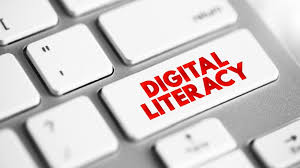Training Course on Future of Work and Digital Skills Integration in Curriculum
Training Course on the Future of Work and Digital Skills Integration in Curriculum is designed to help educators, curriculum developers, and institutional leaders seamlessly embed future-ready competencies into formal and informal learning experiences.

Course Overview
Training Course on the Future of Work and Digital Skills Integration in Curriculum
Introduction
The future of work is rapidly evolving, driven by automation, artificial intelligence, remote work, and global digital transformation. As industries demand adaptable, tech-savvy professionals, educational institutions must pivot to equip learners with the critical digital skills required to succeed. Training Course on the Future of Work and Digital Skills Integration in Curriculum is designed to help educators, curriculum developers, and institutional leaders seamlessly embed future-ready competencies into formal and informal learning experiences. Through this course, participants will gain strategic tools to align curriculum development with emerging workforce trends, digital innovation, and technological disruptions.
With a strong focus on upskilling, reskilling, and edtech implementation, this program addresses the urgent need to bridge the digital divide while promoting equity, inclusivity, and digital fluency. From project-based learning to AI-enhanced instruction, participants will explore globally-relevant strategies that empower both educators and learners for the future workforce. This course prepares education professionals to become leaders in 21st-century teaching and learning by integrating industry 4.0 skills, entrepreneurship, and critical thinking frameworks into their curriculum.
Course Objectives
- Understand the implications of the future of work on curriculum design.
- Identify key digital skills and competencies required in the 21st-century workforce.
- Analyze the impact of artificial intelligence, automation, and robotics on education.
- Integrate coding, data literacy, and digital citizenship in curriculum planning.
- Design inclusive curricula that promote digital equity and access.
- Apply project-based and experiential learning models for skill development.
- Explore global frameworks for digital skills education (e.g., UNESCO, ISTE, WEF).
- Utilize emerging technologies (AR/VR, IoT, AI) in curriculum delivery.
- Promote cross-disciplinary thinking through STEAM and innovation-driven learning.
- Create action plans for implementing tech-enhanced learning in classrooms.
- Develop institutional strategies for ongoing upskilling of educators.
- Use learning analytics and adaptive technologies for personalized instruction.
- Align education outcomes with industry demands and future job trends.
Target Audiences
- Curriculum Developers
- Educational Policy Makers
- School Administrators and Leaders
- Higher Education Faculty
- Instructional Designers
- Technical and Vocational Trainers
- EdTech Consultants
- NGO and International Development Educators
Course Duration: 5 days
Course Modules
Module 1: Understanding the Future of Work
- Trends shaping the global job market
- Skills gap and economic transformation
- Role of automation and AI
- Digital skillsets for the 21st-century learner
- Curriculum responsiveness to labor market changes
- Case Study: World Economic Forum's Future of Jobs Report
Module 2: Core Digital Competencies for Learners
- Digital literacy and fluency
- Online collaboration and productivity tools
- Coding and computational thinking
- Digital communication and netiquette
- Cybersecurity and privacy awareness
- Case Study: European Digital Competence Framework (DigComp)
Module 3: Integrating AI and Emerging Tech in Education
- Role of AI in personalized learning
- Introduction to AR/VR, IoT in classrooms
- Automation tools for instruction
- AI ethics in education
- Technology accessibility and equity
- Case Study: AI4K12 Initiative in U.S. K–12 Curriculum
Module 4: Curriculum Design for Innovation and Creativity
- STEAM-focused interdisciplinary learning
- Entrepreneurship in education
- Design thinking in lesson planning
- Creative problem-solving frameworks
- Critical thinking integration
- Case Study: Finland’s Phenomenon-Based Learning Model
Module 5: EdTech Tools and Learning Platforms
- Learning Management Systems (LMS) for hybrid models
- Mobile learning and microlearning
- Gamification in education
- Open Educational Resources (OERs)
- Selecting the right tools for digital classrooms
- Case Study: Google for Education + Classrooms in Africa
Module 6: Inclusive and Equitable Digital Education
- Bridging the digital divide
- Culturally responsive teaching
- Gender and technology in education
- Supporting learners with disabilities
- Multilingual digital content
- Case Study: UNESCO’s ICT Competency Framework for Teachers
Module 7: Teacher Capacity Building and Professional Development
- Upskilling and reskilling models
- Digital pedagogy principles
- Peer coaching and professional learning communities
- Credentialing and digital badges
- Evaluating teacher tech integration readiness
- Case Study: Microsoft’s Global Training Partner Program
Module 8: Evaluation, Assessment, and Learning Analytics
- Data-driven instruction
- Formative and summative digital assessments
- Adaptive learning systems
- Real-time feedback and dashboards
- Ethical considerations in student data usage
- Case Study: Khan Academy’s mastery-based assessment model
Training Methodology
- Interactive virtual and in-person workshops
- Hands-on demonstrations and practice sessions
- Group work and curriculum co-creation tasks
- Case study analysis and scenario-based learning
- Peer feedback, mentoring, and reflective journaling
- Capstone project: Curriculum innovation plan presentation
Register as a group from 3 participants for a Discount
Send us an email: info@datastatresearch.org or call +254724527104
Certification
Upon successful completion of this training, participants will be issued with a globally- recognized certificate.
Tailor-Made Course
We also offer tailor-made courses based on your needs.
Key Notes
a. The participant must be conversant with English.
b. Upon completion of training the participant will be issued with an Authorized Training Certificate
c. Course duration is flexible and the contents can be modified to fit any number of days.
d. The course fee includes facilitation training materials, 2 coffee breaks, buffet lunch and A Certificate upon successful completion of Training.
e. One-year post-training support Consultation and Coaching provided after the course.
f. Payment should be done at least a week before commence of the training, to DATASTAT CONSULTANCY LTD account, as indicated in the invoice so as to enable us prepare better for you.